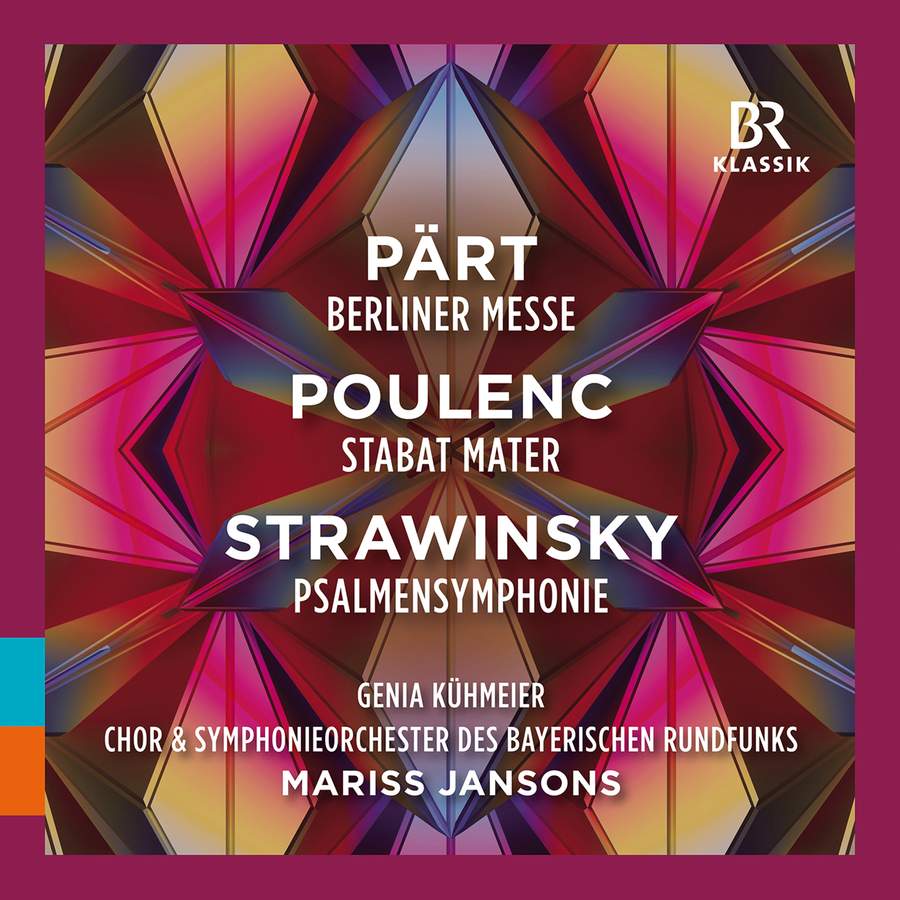PÄRT; POULENC; STRAVINSKY Choral and Orchestral Works
View record and artist detailsRecord and Artist Details
Genre:
Vocal
Label: BR Klassik
Magazine Review Date: 08/2022
Media Format: CD or Download
Media Runtime: 78
Mastering:
DDD
Catalogue Number: 900201

Tracks:
| Composition | Artist Credit |
|---|---|
| Berliner Messe |
Arvo Pärt, Composer
Chor des Bayerischen Rundfunks Mariss Jansons, Conductor Symphonieorchester des Bayerischen Rundfunks |
| Stabat mater |
Francis Poulenc, Composer
Chor des Bayerischen Rundfunks Genia Kühmeier, Soprano Mariss Jansons, Conductor Symphonieorchester des Bayerischen Rundfunks |
| Symphony of Psalms |
Igor Stravinsky, Composer
Chor des Bayerischen Rundfunks Mariss Jansons, Conductor Symphonieorchester des Bayerischen Rundfunks |
Author: Ivan Moody
This is an imaginative and colourful juxtaposition of sacred music for choir and orchestra, different in style and intention as the works are. The substantial forces of the Chor des Bayerischen Rundfunks are in large part responsible for this, in combination with Jansons’s incisive, driven direction. It is remarkable, in fact, just how much of a transformation in the sound world of Pärt’s Berliner Messe is brought about by the use of larger choral forces and orchestra. It acquires a density and richness that the reduced-scoring version consciously strives to avoid. Listen, for example, to the Gloria, with its cascades of sound underpinned by a cushion of strings, or the sheer energy that emanates from the Credo.
Poulenc’s Stabat mater is quite a different matter, of course. Its Stravinsky-tinged harmonies and opulent choral-orchestral blend certainly need the right performers to establish its high seriousness, but a seriousness couched in an idiom that, while it owes as much to French popular traditions as it does to the Baroque, is in the end actually something quite new and utterly moving. This can easily be discerned in sections such as ‘O quam tristis’, emotions here held in careful balance but transmitting a powerful glow of hope. Details such as the very clearly audible harp also help in this; its contribution to Poulenc’s rich orchestration is hardly negligible but it is rare to hear it as clearly as this in a recording.
The Symphony of Psalms makes a logical and satisfying conclusion to this collection of pieces. Once again, this recording impresses in its clarity, allowing all the instrumental layers to be discerned clearly, and as the Poulenc has already shown, there is a natural affinity for the more explosive brassy moments. But the test in this work is how the final movement is approached, whether Stravinsky’s extraordinary ‘suspension of time’ is understood and transmitted. I am happy to report that it is. Jansons’s forces do complete justice to this apotheotic vision, with absolutely no sense of pushing back against the slow tempo, and the shining clarity of the recording quite simply makes it one of the best recordings of this work I have ever heard.
Discover the world's largest classical music catalogue with Presto Music.

Gramophone Digital Club
- Digital Edition
- Digital Archive
- Reviews Database
- Full website access
From £8.75 / month
Subscribe
Gramophone Full Club
- Print Edition
- Digital Edition
- Digital Archive
- Reviews Database
- Full website access
From £11.00 / month
Subscribe
If you are a library, university or other organisation that would be interested in an institutional subscription to Gramophone please click here for further information.




